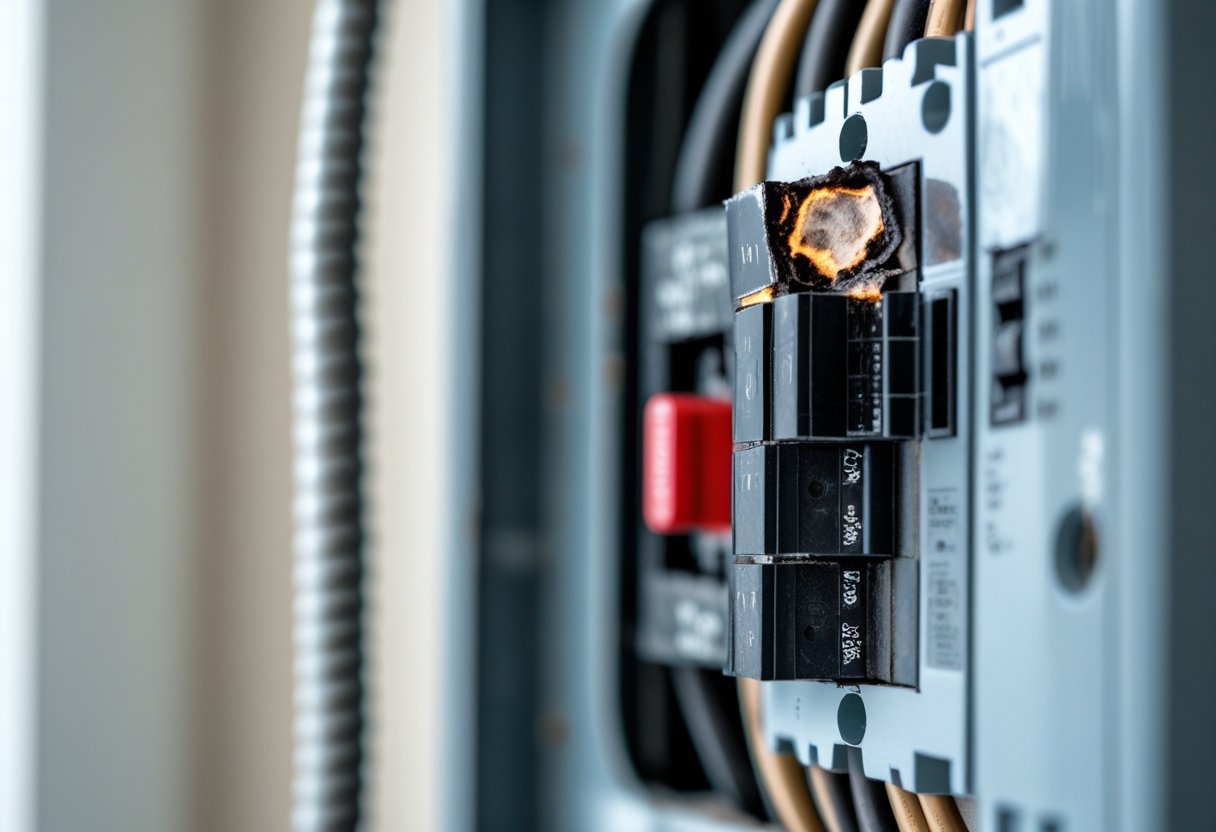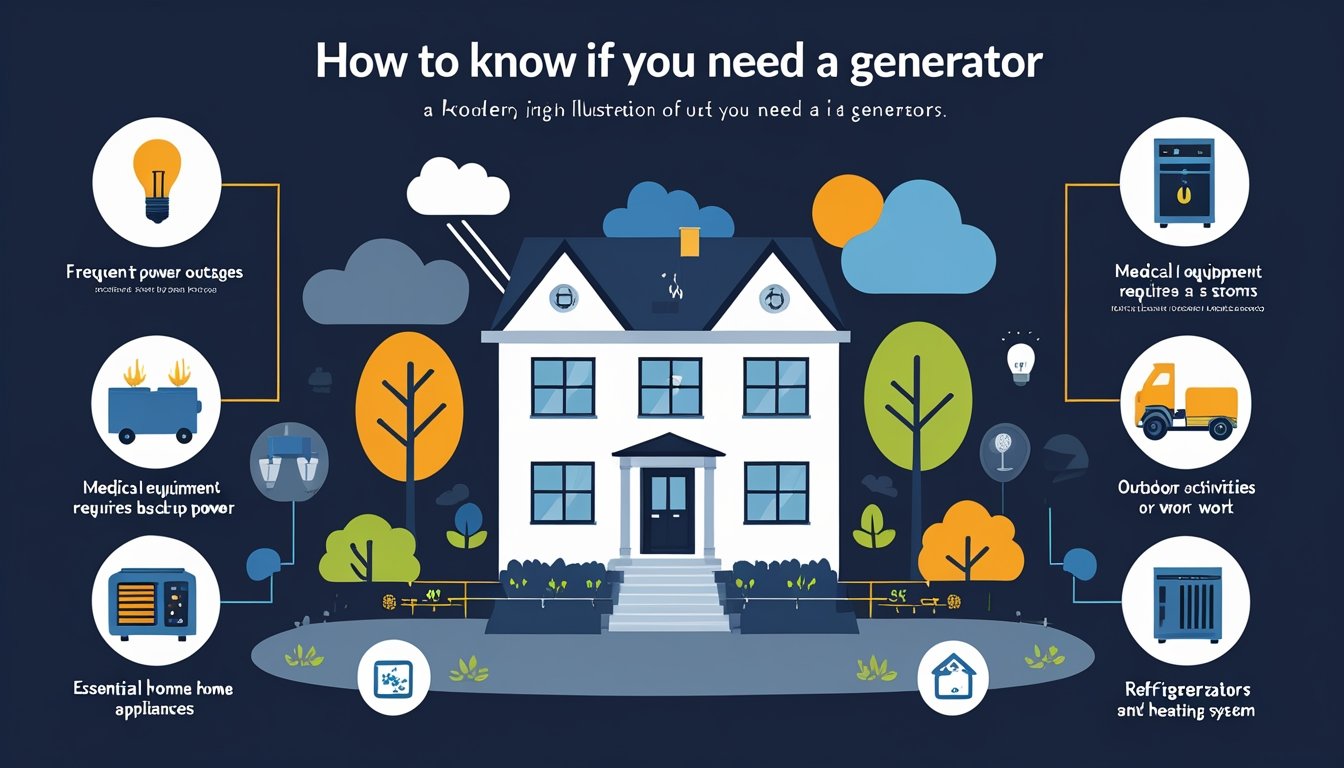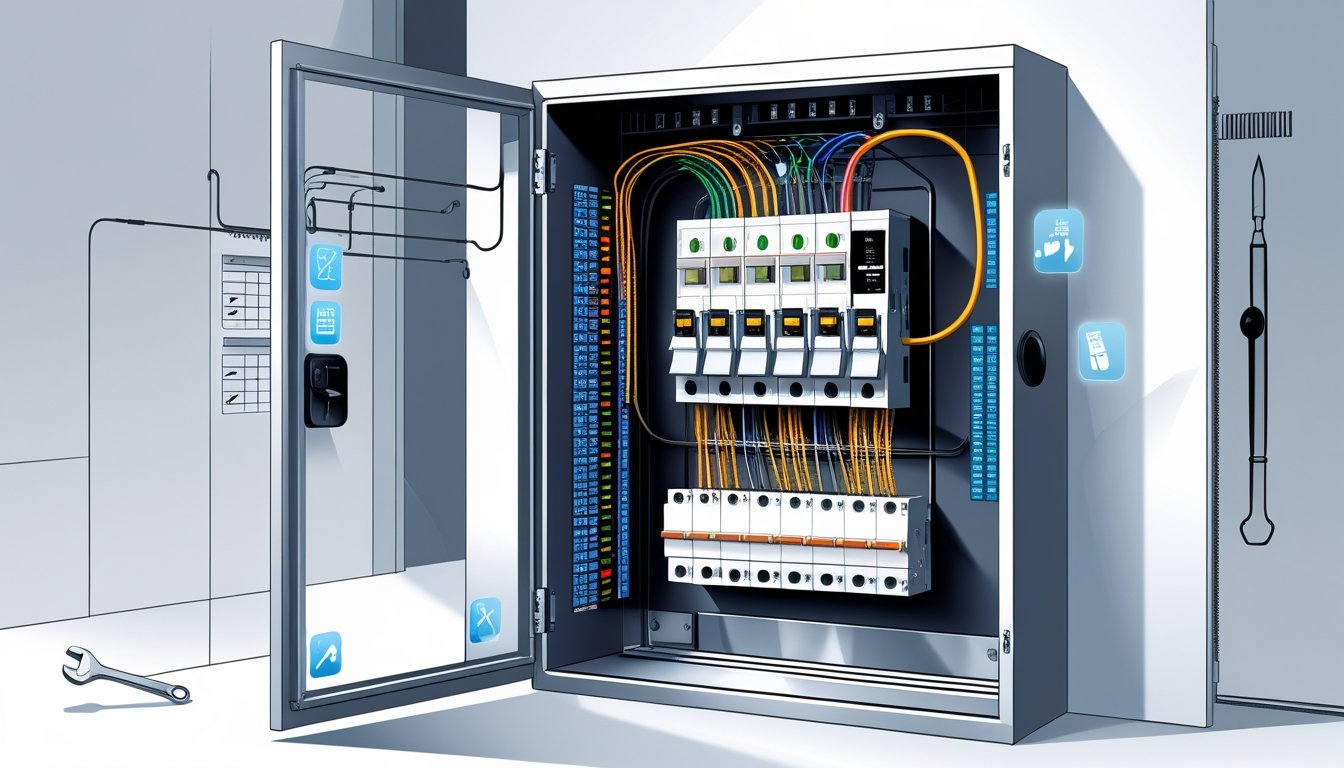A faulty circuit breaker box can cause serious problems in your home’s electrical system. If your breaker keeps tripping, your lights flicker, or you notice a burning smell, these are clear signs something is wrong.
You might also see breakers that won’t reset or hear unusual noises coming from the panel. Sometimes, frequent trips mean the breaker is worn out or the system is overloaded.
Recognizing Common Signs of a Faulty Circuit Breaker Box
Pay close attention to how your circuit breaker box behaves. Certain signs tell you it might be failing or unsafe.
These signs include frequent power interruptions, strange smells, visible damage, and unusual noises.
Frequent Tripped Breakers
When your breakers trip often, it means the system is overloaded or there is a short circuit somewhere. If you find yourself resetting breakers repeatedly, the breaker box could be worn out or unable to handle your home’s electrical load.
Frequent trips may also signal faulty wiring or a broken breaker. These problems put your home at risk of electrical shocks or fires.
Keep track of which breakers trip and how often. Share this with an electrician for a quicker diagnosis.
Burning Smells or Scorch Marks
If you notice a burning smell near your breaker box or see dark scorch marks, stop what you’re doing and take this seriously. These are signs of overheating or electrical arcing, which can cause fires if not fixed.
These smells usually come from loose connections or damaged wiring inside the panel. Call a professional to inspect your breaker box right away if you detect these signs.
Visible Corrosion or Rust
Corrosion or rust on your breaker box can weaken the metal parts and connections inside. This often happens when moisture gets into the box, which is dangerous in an electrical system.
Rust can cause breakers to fail or stop working properly. Look for any greenish or reddish buildup around breakers or wires.
If you see rust or corrosion, have an electrician check your panel before it causes bigger problems.
Crackling or Buzzing Sounds
Hearing crackling, buzzing, or popping noises coming from your circuit breaker box is a warning sign. These sounds usually mean there are loose wires, worn breakers, or an overloaded system.
If you hear anything unusual from your panel, don’t try to fix it yourself. Contact a professional electrician to diagnose and repair the issue.
Electrical Performance Issues
Electrical problems often show up in how your home’s power behaves. You might notice changes in light brightness, strange shifts in power, or parts of your home losing electricity.
Flickering or Dimming Lights
If your lights flicker or dim often, this could mean your circuit breaker box is struggling. Flickering lights happen when there is an unstable flow of electricity.
This could be caused by a loose connection or a breaker that is starting to fail. Dimming lights, especially when using appliances, might show your circuits are overloaded.
When this happens, your breaker may trip to stop damage. It’s important to check your breaker box if you see these signs regularly.
Unusual Power Fluctuations
Power that fluctuates without reason—like appliances turning on and off or unusual sounds from devices—can point to a faulty breaker. These issues mean the electricity is not flowing steadily.
Your breaker box should keep power stable. If it can’t, it might cause short circuits or overloads.
These problems can damage electronics or create safety risks. Power changes like surges or drops need to be checked by a professional right away.
Outlets Not Working
When some outlets stop working, it is often due to a faulty breaker or wiring problem inside the breaker box. This issue can happen in one room or multiple parts of your home.
If resetting breakers doesn’t fix dead outlets, the breaker could be worn out or damaged. You should avoid trying repairs yourself as the problem might be electrical and dangerous.
Have an electrician inspect your breaker box to find the cause and fix it safely.
Physical and Visual Indicators
You can often spot problems with your circuit breaker box just by looking or feeling. Some signs are easy to notice, like breakers that don’t feel right when you touch them or parts that look worn or damaged.
Loose or Hot Breakers
If a breaker feels loose or moves more than it should, this is a warning sign. Breakers need to stay firmly in place to work properly.
A loose breaker can cause poor electrical contact, which may lead to overheating or sparks. You might also notice that some breakers feel hot to the touch.
This is not normal and usually means the breaker is carrying too much current or there is a bad connection inside the box. A breaker that’s hot could be unsafe and should be checked by a professional right away.
Damaged Box Components
Look inside your breaker box for any signs of damage like cracked plastic, broken parts, or corrosion on metal components. Damage can weaken the electrical system and cause failure or shorts.
Corrosion or rust, especially on wires or terminals, can stop electricity from flowing correctly. If you see any of these issues, your circuit breaker box needs repair or replacement soon to keep your home safe.
Discolored Breaker Switches
Discolored breaker switches are a clear visual clue something is wrong. If you see dark marks, burn spots, or melted plastic on the switch, it often means overheating or electrical arcing happened.
These signs suggest the breaker has experienced stress and might not protect your home properly. Call an electrician to inspect and fix the problem to prevent further damage.
Potential Safety Risks Associated With Faulty Breaker Boxes
A faulty breaker box can cause serious problems in your home’s electrical system. It can lead to dangerous situations that put you and your family at risk.
Electrical Fire Hazards
When a breaker box is not working right, it might fail to stop electrical faults like overloads or short circuits. This can cause wires to overheat and spark fires.
You might notice signs such as a burning smell, scorch marks, or melted plastic near your panel. If your breakers are frequently tripping but not stopping the electrical problem, wiring could become damaged inside your walls.
This damage is often hidden until it causes a fire. To lower your risk, check your breaker box regularly for any unusual noise, heat, or smells.
Shock Risks
Faulty breaker boxes may also fail to protect you from electrical shocks. Breakers work by cutting power when a ground fault or short happens.
When they don’t trip properly, you could touch a surface that is unexpectedly live. This risk is higher in areas where water is present, like kitchens, bathrooms, or outdoor outlets.
If your breaker box doesn’t respond correctly, you and others could get a severe shock while using appliances or tools. If you experience any shocks or tingling when touching switches or plugs, have a professional check your breaker box right away.
Causes of Circuit Breaker Box Problems
Circuit breaker boxes can develop issues for a few common reasons. Problems often happen when parts wear out over time or when your electrical system is pushed beyond its limits.
Aging Electrical System
As your home’s electrical system gets older, the circuit breaker box can start to fail. Metal parts inside the breaker can wear down or corrode.
This wear can make the breaker less reliable at stopping electrical surges. Old wiring connected to the box can also become brittle or loose.
These problems increase the chance of shorts or overheating. If your home is more than 20 years old, have the electrical system checked regularly.
Signs of aging include breakers that trip even when you aren’t using much power. You might also notice flickering lights or strange smells like burning near the breaker box.
Overloaded Circuits
One of the main causes of circuit breaker problems is overloaded circuits. This happens when too many devices or appliances run on the same circuit at once.
The breaker trips to stop the flow of electricity and protect your home. You might overload a circuit by plugging many electronics into one outlet or power strip.
Kitchen appliances and heaters often use a lot of power and can cause trip issues if used on the same circuit. To avoid overloads, spread out your devices across different outlets.
If your breakers keep tripping when normal devices are plugged in, you might need to upgrade your panel or add new circuits.
When to Seek Professional Electrical Help
If you notice ongoing problems with your circuit breaker or feel like your electrical system struggles to keep up, professional help is important. Some issues need more than a simple reset or quick fix.
Complex or Persistent Issues
If your breaker trips often and won’t reset, it may be a sign of a serious problem like a short circuit or faulty wiring. Don’t keep resetting it yourself.
Other signs like burning smells, flickering lights, or unusual noises also mean you should call a licensed electrician. Only experts have the tools and knowledge to safely check your system and fix hidden problems.
Upgrading Old Breaker Panels
If your breaker trips frequently because your panel can’t handle your home’s power needs, it might be time for an upgrade. Older panels may not support modern appliances or extra circuits, leading to constant overloads.
Upgrading your breaker panel can help stop these trips and improve safety. A professional can assess your power needs and recommend the right panel that fits your home’s electrical load.
Preventive Tips to Avoid Future Breaker Box Faults
You can protect your breaker box by checking it regularly and using appliances safely. These steps help catch problems early and reduce the chance of electrical faults that might cause trips or damage.
Routine Inspection Practices
Looking at your breaker box often helps you spot small issues before they get worse. Check for any burning smells, visible damage, or loose wires around the panel.
Pay close attention if breakers trip frequently or if you see signs of rust or corrosion on the box. Use a flashlight for a clear view inside.
Make it a habit to test breakers by turning them off and on to ensure they reset properly. If you notice any unusual behavior, call a licensed electrician for a thorough check.
Safe Appliance Use
You can reduce breaker problems by avoiding overloads. Don’t plug too many devices into one outlet or circuit.
Spread out appliance use across different outlets. High-power devices like heaters or ovens should have their own dedicated circuits.
Always check that your appliances are in good condition with no frayed cords or damage. Faulty devices can cause short circuits or overloads that wear down your breaker box faster.
By using your appliances responsibly, you help keep your home’s electrical system stable and safer over time.
Frequently Asked Questions
Knowing the signs of a faulty circuit breaker box helps you keep your home safe. Watch for frequent breaker trips, burning smells, or flickering lights to spot problems early.
It also helps to know when your breaker box might be old or failing.
What are the common indicators that my circuit breaker may be malfunctioning?
If your breaker trips often, it might be bad. Flickering lights and buzzing sounds near outlets can also mean there’s a problem.
You may also notice appliances not working properly.
How can I tell if my circuit breaker box is outdated and needs replacing?
If your breaker trips frequently and your home has many new appliances, your box could be too old. Overloaded circuits and breakers that won’t reset easily are signs you might need an upgrade.
Are frequent electrical surges a sign of a problem with my breaker box?
Yes. Frequent surges mean your breaker box is not handling the electrical load well.
This can lead to damage if you don’t fix it soon.
What does it mean if my circuit breaker keeps tripping?
Your breaker could be detecting an overload, a short circuit, or a ground fault. These trips protect your home from electrical fires or damage.
Should I be concerned about a burning smell coming from my circuit breaker panel?
Yes, a burning smell is serious. It often means there is overheating or an electrical issue inside the panel.
You should have it checked immediately by a professional.
How do I safely identify issues with my home's electrical circuit breaker?
Start by looking for signs like flickering lights or tripping breakers.
You can also test the breaker with a voltmeter.
If you feel unsure, call a qualified electrician to avoid risks.





